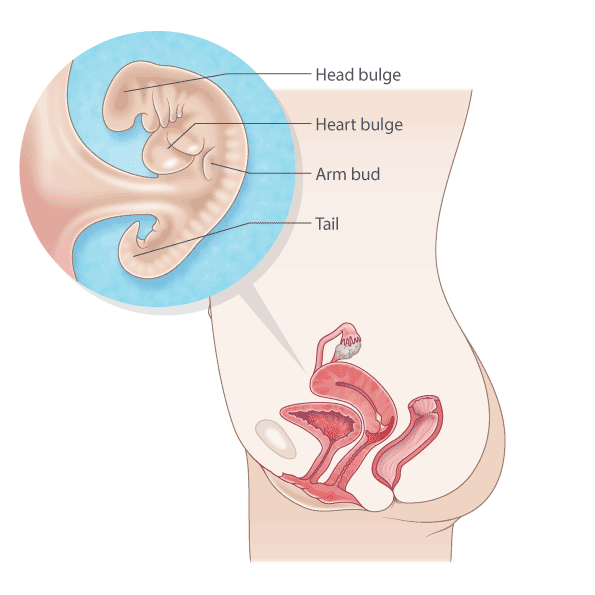
Week 6 of Pregnancy: A Time of Rapid Development
At six weeks pregnant, you’re officially in the second month of your pregnancy journey. This week marks a significant milestone in the development of your baby, as the embryo transitions into a fetus and begins to take on more human-like features.
Fetal Development
- Embryo to Fetus: By week 6, the embryo has grown from a tiny cluster of cells to a recognizable fetus. The neural tube, which will eventually form the brain and spinal cord, has closed.
- Limb Development: The buds that will become your baby’s arms and legs begin to appear.
- Facial Features: The eyes, nose, and mouth start to take shape, and the ears begin to develop.
- Heart Development: The heart is fully formed and begins to beat regularly.
- Size: The fetus is about the size of a lentil, measuring approximately 0.25 inches (6 millimeters) in length.
Your Body
- Hormonal Changes: Pregnancy hormones, such as progesterone and estrogen, continue to rise, causing various physical and emotional changes.
- Breast Tenderness: Your breasts may become tender and swollen as they prepare for milk production.
- Nausea and Vomiting: Morning sickness, also known as nausea and vomiting, is common during the first trimester.
- Fatigue: Increased levels of progesterone can make you feel tired and fatigued.
- Frequent Urination: As your uterus grows, it puts pressure on your bladder, leading to more frequent urination.
- Weight Gain: You may start to gain a small amount of weight as your body stores nutrients for the baby.
Emotional Changes
- Mood Swings: Fluctuating hormone levels can cause mood swings, irritability, and emotional sensitivity.
- Anxiety and Stress: It’s normal to feel anxious or stressed during pregnancy, especially if it’s your first time.
- Emotional Support: Seek support from your partner, family, friends, or a therapist if you’re struggling with emotional challenges.
Medical Care
- Prenatal Appointment: Schedule your first prenatal appointment with your healthcare provider around week 6-8.
- Ultrasound: An ultrasound may be performed to confirm the pregnancy and check the baby’s heartbeat.
- Blood Tests: Blood tests will be done to measure hormone levels, check for infections, and determine your blood type.
- Prenatal Vitamins: Start taking prenatal vitamins, which contain essential nutrients for your baby’s development.
Lifestyle Recommendations
- Healthy Diet: Eat a balanced diet rich in fruits, vegetables, whole grains, and lean protein.
- Hydration: Drink plenty of fluids, especially water.
- Exercise: Engage in regular moderate-intensity exercise, such as walking, swimming, or prenatal yoga.
- Avoid Alcohol and Smoking: Avoid alcohol and smoking, as they can harm your baby.
- Get Enough Sleep: Aim for 7-9 hours of sleep each night.
- Manage Stress: Find healthy ways to manage stress, such as meditation, yoga, or spending time in nature.
Common Concerns
- Bleeding: Light spotting or bleeding is common in early pregnancy. However, heavy bleeding or cramping requires immediate medical attention.
- Miscarriage: The risk of miscarriage is highest during the first trimester. If you experience severe pain, bleeding, or other concerning symptoms, seek medical attention immediately.
- Ectopic Pregnancy: An ectopic pregnancy occurs when the fertilized egg implants outside the uterus. This is a medical emergency that requires immediate treatment.
Conclusion
Week 6 of pregnancy is a time of significant changes and milestones. As your baby continues to develop rapidly, your body and emotions will also undergo adjustments. By understanding these changes and following the recommended medical care and lifestyle guidelines, you can support a healthy pregnancy and the well-being of your growing fetus.